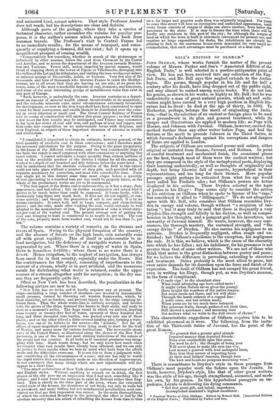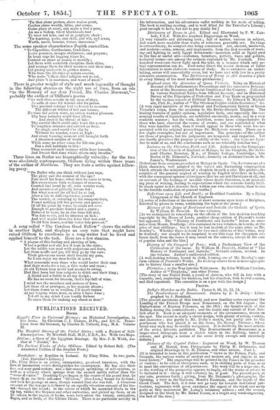BELL'S EDITION OF OLDHAM"
Toro' Oknimi, whose works furnish the matter of the present volume of Messrs. Parker and Son's " Annotated Edition of the English Poets," is well selected in a poetico.antiquarian point of view. He has not been received into any collection of the Eng- lish Poets, and Mr. Bell says this neglect extends to the Antho- logies. His poems, though popular in his life and for half a century after his death, have long dropped out of the public sight, and may almost be ranked among scarce books. We do not rate his genius, as shown in his works, so highly as Mr. Bell ; but he was undoubtedly a man of great natural powers, which art and culti- vation might have carried to a very high position in English lite- rature had he lived : he died at the age of thirty, in 1683. To Rochester, perhaps, belongs the merit of originating the Imita- tion,—that is, the selection of an ancient or foreign piece to be used as a groundwork in its plan and general treatment, while its images and illustrations are applied to modern life ; as Pope with Horace, and Johnson with Juvenal. Oldham, however, carried the method further than any other writer before Pope, and had the fortune or the merit to precede Johnson in the Third Satire, in which Juvenal's declamation against the corruptions and dangers of Rome are applied to London. The subjects of Oldham are occasional poems and satires, either original or imitated from Horace, Juvenal, and Boileau. in point of careful treatment and mechanical finish, the occasional pieces are the best, though most of them were the earliest written ; but they are composed in the style of the metaphysical poets, displaying their learning undoubtedly, as well as thoughts of originality and depth, but being likewise full of conceits, hyperbolical in their representations, and too long for their themes. More popular passages might perhaps be extracted from what his age would have called his Pindaric odes; but Oldham's powers are better displayed in his satires. These Dryden selected as the topic of praise in his Elegy : Pope seems only to consider the satires in his criticism on Oldham when he spoke to Spence of his "rage," but considered it allied to "Billingsgate." We do not altogether agree with Mr. Bell, who considers that Oldham resembles Dry- den in energy and volume, though without " a suspicion of imi- tation " • but it may truly be said that there is frequently a very Dryden-like strength and felicity in his diction, as well as compre- hension in his thoughts, and a pungent gall in his invectives, not unworthy of Juvenal himself. He wants, however, the easy copi- ousness, the thorough mastery, the sustained strength, and "the energy divine" of Dryden. He also carries his negligence to an extreme. Dryden is frequently negligent, often rough and un- finished; but Oldham's excellence is the exception, his negligence the rule. It is this, we believe, which is the cause of the obscurity into which he has fallen ; not his indelicacy, for his grossness is not greater than that of some other writers. We are not of those who think that metre is the great distinction between poetry and prose; for we believe the difference is pervading, extending to structure and treatment. Satire probably is the most allied to prose, but even satire depends for its duration upon the force and finish of its expression. The fault of Oldham has not escaped his great friend, even in writing his Elegy, though put, as was Dryden's manner, in the form of compliment.
" 0 early ripe ! to thy abundant store
What could advancing age have added more ? It might (what Nature never gives the young) Have taught the numbers of thy native tongue. But satire needs not these, and wit will shine Through the harsh cadence of a rugged line : A noble error, and but seldom made, When poets are by too much force betrayed. Thy generous fruits, though gathered ere their time, Still showed a quickness ; and maturing time But mellows what we write to the dull sweets of rhyme."
This characteristic ruggedness of Oldham requires him to be exhibited piecemeal as it were. The following, from the imita- tion of the Thirteenth Satire of Juvenal, has the point of the great Roman.
" 'Tis granted that a greater grief attends Departed moneys than departed friends : None ever counterfeits upon this score, Nor need he do't ; the thought of being poor Will serve alone to make the eyes run o'er. Lost money's grieved with true unfeigned tears, More true than sorrow of expecting heirs At their dead fathers' funerals, though here The back and hands no pompous mourning wear."
There is resemblance to Dryden's style in these passages from Oldham's most popular work the Satires upon the Jesuits. In truth, however, Dryden's style, like that of other great writers, was the,style of his age, though strengthened, animated, and made his own, by his genius. In this hyperbolical panegyric on im- pudence, Loyale is delivering his dying commands.
" Get that great gift, and talent, impudence, Accomplished mankind's highest excellence : • Poetical Works of John Oldham. Edited by Robert Bell. [Annotated Edition of the English Poets.] Published by Parker and Son. 'Tie that alone prefers, alone makes great, Confers alone wealth, titles, and estate, Gains place at court, can make a fool a peer, An ass a bishop, vilest blockheads rear To wear red hats, and sit in porphyry chair ; 'Tie learning, parts, and skill, and wit, and sense, Worth, merit, honour, virtue, innocence."
The same speaker characterizes Popish austerities.
"To Capuchins, Carthusians, Cordeliers, Leave penance, meagre abstinence, and prayers ; In lousy rags let begging friars lie, Content on straw or boards to mortify ; Let them with sackcloth discipline their skins, And scourge them for their madness and their sins ;
Let pining endue ets in grottos starve,
Who from the liberties of nature swerve, Who make 't their chief religion not to eat, And place 't in nastiness, and want of meat."
There is greater weight of style and much ingenuity of thought in the following stanzas on the right use of time, from an ode "to the Memory of my dear Friend, Mr. Charles Morwent,"— probably the earliest of Oldham's poems
" So well thou actedst in thy span of days,
As calls at once for wonder and for praise. The prudent conduct had ca learnt to measure The different whiles of toil and leisure, No time did action want, no action wanted pleasure. Thy busy industry could time dilate, And stretch the thread of fate: Thy careful thrift could only boast the power To lengthen minutes and extend an hour.
No single sand could e'er slip by Without its wonder, sweet as high : And every teeming moment still brought forth A thousand rarities of worth.
While some no other cause for life can give, But a dull habitude to live : Thou scornedst such laziness while here beneath, And livedst that time which others only breathe."
These lines on Butler are biographically valuable; for the two were absolutely contemporary, Oldham dying within three years
of the author of Hudibras. They are from a satire against follow-
ing poesy.
" On Butler who can think without just rage, The glory and the scandal of the age ? Fair stood his hopes when first he came to town, Met everywhere with welcomes of renown, Courted and loved by all, with wonder read, And promises of princely favour fed : But what reward for all had he at last, After a life in dull expectance passed ? The wretch, at summing up his misspent days, Found nothing left but poverty and praise ; Of all his gains by verse, he could not save Enough to purchase flannel and a grave ; Reduced to want, he in due time fell sick, Was fain to die, and be interred on tick ; And well might bless the fever that was sent To rid him hence, and his worse fate prevent."
A song called " The Careless Good Fellow" shows the satirist in another light, and displays an easy vein that might have raised Oldham to excellence as a song-writer had he lived and applied himself to the task. Here are a few stanzas.
" A plague of this fooling and plotting of late, 'What a pother and stir has it kept in the state ; Let the rabble run mad with suspicions and fears, Let them scuffle and jar, till they go by the ears; Their grievances never shall trouble my pate, So I can enjoy my dear bottle at quiet.
What coxcombs were those who would barter their ease
And their necks for a toy, a thin wafer and mass ; At old Tyburn they never had needed to swing, Had they been but true subjects to drink and their king ; A friend and a bottle is all my design; He has no room for treason, that's top-full of wine.
I mind not the members and makers of laws, Let them sit or prorogue, as his majesty please ;
Let them damn us to woollen, ril never repine
At my lodging when dead, so alive I have wine ; Yet oft iu my drink I can hardly forbear To curse them for making my claret so dear."



































 Previous page
Previous page